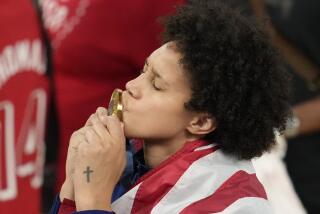COMMENTARY : Games Mean More Than Medal Count
- Share via
ATLANTA — Matt Ghaffari probably had the toughest job at the Atlanta Olympics. The U.S. super-heavyweight had to wrestle Russia’s Alexander Karelin, perhaps the most feared athlete in the world. The 286-pound Karelin likes to lift foes over his head, then smash them to the mat. Sometimes, opponents get pinned on purpose to avoid meeting Karelin because they fear for their lives.
In the final, Ghaffari lost to Karelin, 1-0, in overtime. “When I heard the Russian anthem after my match, I felt I had failed my country,” said Ghaffari, whose family immigrated from Iran 20 years ago. When Ghaffari heard the “Star-Spangled Banner” at other victory ceremonies, “I broke down” and cried.
The next day, however, in Atlanta’s streets, Ghaffari was constantly congratulated on his silver medal. “I thought people would be mad at me. Instead, they told me how proud they were of me.”
“That is why we came here,” Ghaffari’s mother told him. “This country is so gracious. They forgive you as long as you try your best.”
That is how some of us feel about Atlanta and these Games. It’s almost impossible to ruin the Olympics. And Atlanta proved it.
For the athletes here and the fans who watched them, this was an easy Olympics to forgive for its flaws. Every Olympics begins with such shared idealism that few ever lose their cheerfulness. Still, Georgia tried to outdo its reputation for Southern hospitality.
Everything that took place here once you entered an Olympic venue was as superb as any Games could realistically hope to be. Crowds were enormous and, with the U.S. winning 101 medals, mostly joyous. More people attended women’s events here than had attended all events in Barcelona combined.
“When I walked the streets, everybody seemed to know my name,” said bronze medal diver Mary Ellen Clark. “I feel like the girl next door. I’m their friend and they’re my friends. It’s a nice warm fuzzy feeling.”
Before this Olympics--and, unfortunately, during it--chief organizer Billy Payne thumped his tub about these being “the greatest Olympics ever.” When he got excited, he’d up the ante: his Games would be the most important peacetime event of the 20th century. To drum up 90,000 volunteers, such innocent boosterism is a big help. However, when things go wrong and you just keep beating the drum, you don’t look too good. And that’s too bad.
Much of what took place outside Olympic venues--on an ACOG bus, in a MARTA subway, in Centennial Olympic Park, in the downtown streets or in the massive lines at security checkpoints--was cheesy or ridiculously congested. From an organizational point of view, this wasn’t the “greatest” of Games. You only have to go back to Barcelona for a better one.
Also, the commercialism that ate downtown Atlanta was total. Locals, trying to deflect mockery, called it a “state fair” atmosphere. OK, if the state fair takes place in a strip mall.
When these Games are remembered, it probably will be as a stubborn triumph, but a mixed blessing for Atlanta. Without using any public money, this town got $450 million worth of new buildings, plus enormous exposure to the corporate multinationals it worships. But it also came off as a city that’s not ready to join New York, Chicago and Los Angeles.
The Olympics itself, however, gained stature. The two deaths early that Saturday morning only tightened the sense of solidarity among those who were here. The crowds grew bigger and louder during the second week. The street life, though comically congested, was full of camaraderie. Many noticed that, in those streets, it was almost impossible to figure out who was American and who was not. In a sense, we are so ethnically diverse already that we are the world. Yet our cultural influence--for better and for worse--is so pervasive that, each day, the world becomes more like us.
This was not really the Atlanta Games so much as it was the American Olympics--the first true one, with the whole world aboard, since 1924. As such, it celebrated our diversity and hospitality, our gauchery and our generosity, our isolated lunatics and our general decency. The world saw our passion for excellence and our penchant for every excess.
From Kerri Strug to Billy Payne to the most hopelessly lost bus driver in Georgia, everybody tried their best. And, despite everything, from irritating trivialities to real tragedy, the Games were great.
More to Read
Go beyond the scoreboard
Get the latest on L.A.'s teams in the daily Sports Report newsletter.
You may occasionally receive promotional content from the Los Angeles Times.






